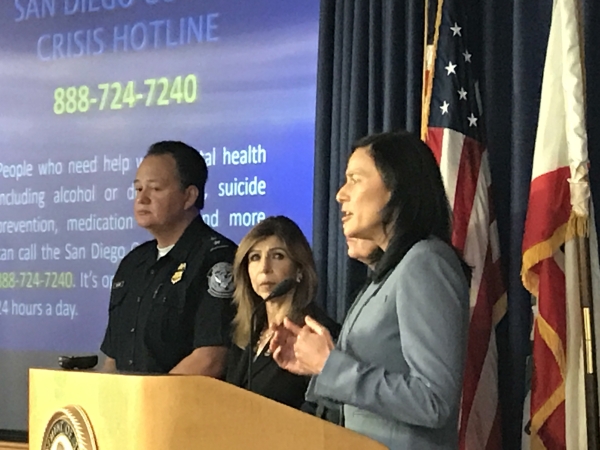County’s Top Law Enforcers Issue Dire Warning about Fentanyl, Carfentanil as Deaths and Border Seizures Spike

SAN DIEGO – The county’s top law enforcement officials issued a dire warning today about a dramatic surge in deaths and international trafficking activity related to Fentanyl and its even more deadly cousin, carfentanil.
While Fentanyl is 30-50 times more powerful than heroin, concern among law enforcers has intensified with the emergence of carfentanil, a drug 100 times stronger than fentanyl that is normally used as a sedative for animals like elephants. It only takes a few granules the size of grains of table salt to kill someone.
At a news conference today, officials reported a significant increase in fentanyl-related deaths in San Diego County since 2014 – which mirrors a national trend. In calendar year 2017, there have been 40 overdoses in the first nine months - more than all of 2016. And, the Medical Examiner has 11 more fentanyl cases pending confirmation, which would bring the number to 51 with three months to go. Across the country, more than 64,000 people have died as the result of an opioid overdose in 2016.
More than 75 percent of fentanyl seizures across the southwest border is coming through ports of entry in the Southern District of California from Mexico. Law enforcement officials have responded by seizing unprecedented quantities of fentanyl.
Federal seizures of fentanyl at the border in San Diego and Imperial counties have almost tripled since last year, from 19 to 54. The year before that, in 2015, there were only six seizures. That’s a 700 percent increase in two years.
Federal authorities, led by U.S. Customs and Border Protection and Homeland Security Investigations, confiscated 480 kilograms of illicit fentanyl at the border this year. That’s more than half a ton and almost double last year’s take. Just two years ago, authorities seized just 30 kilograms.
“This rapid increase in seizures and deaths tells us that we are on a very dangerous trajectory,” said Acting U.S. Attorney Alana Robinson. “There is no question that this is an epidemic with legs and it is sprinting. Every law enforcement agency in our community, whether federal, local or state, is on high alert. We will not allow San Diego and Imperial Counties to serve as a Fentanyl Gateway for the rest of the country. Nor will we allow Mexican cartels to capitalize on the opiate crisis.”
“A tiny amount of fentanyl can be lethal and today’s street buy can be tomorrow’s funeral,” District Attorney Summer Stephan said. “People buying drugs can’t be sure of what they’re really getting, making it a dangerous game of Russian roulette. Deaths due to unintentional combinations of drugs have roughly doubled in San Diego County in the last 15 years.”
“Homeland Security Investigations (HSI) San Diego Special Agents, together with our law enforcement partners, are working diligently to identify and ultimately dismantle the criminal organizations responsible for the transnational movement of these dangerous drugs,” said David Shaw, special agent in charge for HSI in San Diego. “HSI is committed to fully investigating and seeking prosecution of those individuals committing these crimes, in order to keep our communities safe and clear of these dangerous drugs.”
“Fentanyl is a dangerous substance, and we are not only concerned with keeping it out of our communities but also for the safety of our officers when they come into contact with it,” said San Diego CBP Director of Field Operations, Pete Flores. “We are grateful for the collaborative efforts of our law enforcement partners to deliver consequences to those that smuggle fentanyl and for working to get this off of our streets.”
“Fentanyl is 30 to 50 times more potent than heroin which makes it one of the most deadly drugs on our streets today,” said San Diego Police Chief Shelley Zimmerman. “That is why we must get the word out to everyone. This is about saving lives and educating our community about the dangers of illegally using Fentanyl.”
“DEA is attacking the opioid crisis on two levels: arresting the people who are responsible for trafficking these deadly substances; and educating the public about the dangers of opioid abuse,” says DEA San Diego Special Agent in Charge William R. Sherman. “This year, DEA has spoken at over 60 elementary, middle, high schools, and colleges in San Diego County and Imperial Counties reaching over 17,000 students, along with parent and community groups, and countless national and local media outlets to discuss the dangers of opioid abuse. DEA will continue its diligence in making our residents aware of the deadly danger these drugs pose.”
“Our collaborative efforts, through taskforces, sharing resources and intel, and leveraging expertise, are having an impact in neighborhoods across the country. There is a great deal yet to accomplish, as our nation struggles with this epidemic,” said Nichole Cooper, Inspector in Charge, Los Angeles Division, U.S. Postal Inspection Service. “Whether these illegal substances are sourced by smuggling, commercial shippers or the mail, the United States Postal Inspection is committed to working on behalf of American citizens, alongside our partners, to help safeguard communities and bring offenders to justice. We will continue to work with our law enforcement partners to get dangerous individuals and drugs off our streets.”
“The Sheriff's Department is committed to collaborating with our local, state and federal law enforcement partners to address the national opioid epidemic,” said Sheriff’ Bill Gore. “By working together, law enforcement and our community partners can create new and effective solutions to save lives and stop this devastating crisis.”
“The opioid crisis gripping our nation has become far-reaching and widespread, touching every corner of the United States, including the greater San Diego area,” stated IRS Criminal Investigation’s Special Agent in Charge R. Damon Rowe. “IRS Criminal Investigation will not stand still while deadly synthetic drugs like fentanyl are sold on the streets, literally destroying our communities. By fighting this epidemic, we are saving lives and sending a clear message that those who seek to profit by peddling poison will be put out of business and brought to justice.”
Here are a few more trends:
-Fentanyl trafficking is a very lucrative business. One kilogram of fentanyl costs about $32,000 and can be used to create a million counterfeit pills for a profit of more than $20 million.
-Users are ordering up fentanyl from the so-called “Dark Web” like they would order something from Amazon. The drug is being purchased online from China and sent directly to customers by mail or express delivery service in the U.S.
-Fentanyl is turning up in counterfeit oxycodone pills – agents in this district have seized over 20,000 counterfeit oxycodone pills containing fentanyl in 2017, protecting Southern California from Mexican cartels seeking to capitalize on the opiate crisis.
In one case this year, a Medical Examiner analyst studied a counterfeit Oxycontin 40 milligram pill found at the scene of an overdose; he literally found 20 different ingredients contained in the pill, including fentanyl.
“You may think you’re buying Oxy on the streets or from the web, but there’s no way to know what’s inside that pill,” said U.S. Attorney Robinson. “With every pill you purchase illicitly on the streets or through the web, and consume, you are gambling with your life. With every pill, you are making a potentially life-changing decision. Because if you end up with a tainted dose, you are done. You leave children behind, your parents behind, your spouses behind.”
The law enforcement community has taken this problem very seriously and developed a multi-level strategy that involves a number of approaches from different disciplines.
-The U.S. Attorney’s Office and its partners created a local Fentanyl Working Group in April. This is a multi-dimensional group that includes local, state and federal investigative agencies, toxicologists, the Medical Examiner’s Office, DEA Lab Chemists, first responders, plus local, county and federal prosecutors. This synergistic multi-disciplinary collaboration is a significant step in working together to promote streamlined investigations.

The Fentanyl Working Group held an educational Fentanyl Forum on June 14 where more than 260 local and federal law enforcement officers learned about the dangers of encountering fentanyl in the field; the local smuggling trends from Mexico and China to the U.S.; parcel interdiction cases, prosecution of overdose cases in state and federal courts; and prosecution collaboration with our office and that of the District Attorney. A second Fentanyl Forum is scheduled on November 28, 2017.
The Fentanyl Working Group is also committed to arming the community and first responders with the important information they need to stay safe. Last week, for example, our office educated East County staff who work with Drug Endangered Children on fentanyl dangers, the importance of Naloxone, and available county resources.
The U.S. Attorney’s Office and District Attorney’s Office are working closely with the Medical Examiner’s Office on overdose cases involving fentanyl or carfentanil to trace the origin of these deadly substances and build possible murder cases against suppliers. The Working Group is advising law enforcement officers who respond to overdose cases to carry Naloxone and to investigate these situations as possible murder cases.
People who need help with mental health including alcohol or drug abuse, suicide prevention, medication needs, and more can call the San Diego County Crisis line at 888-724-7240. It’s open seven days a week, 24 hours a day.
The following public officials are attending today’s press conference and are available for one-on-one interviews at the event’s conclusion:
Acting U.S. Attorney Alana Robinson
San Diego County District Attorney Summer Stephan
Homeland Security Investigations Special Agent in Charge David Shaw
Pete Flores, Director of Field Operations, San Diego, U.S. Customs and Border Protection
San Diego Police Chief Shelley Zimmerman
San Diego County Sheriff’s Commander Dave Moss
Acting Assistant Special Agent in Charge Adam Steiner, IRS Criminal Investigation
DEA Lab Director James Malone
Steven Campman, Chief Deputy Medical Examiner, San Diego County Department of the Medical Examiner
Assistant Inspector in Charge Eric Shen, US Postal Inspection Service
Postal Inspector Mark Hallisey, San Diego Field Office

 U.S. Department
of Justice
U.S. Department
of Justice